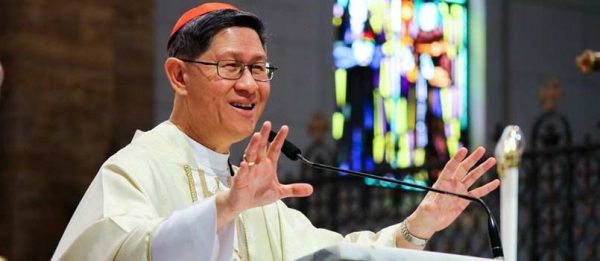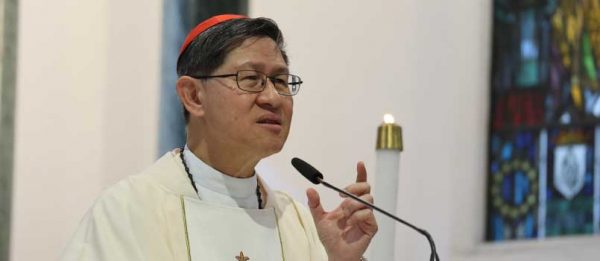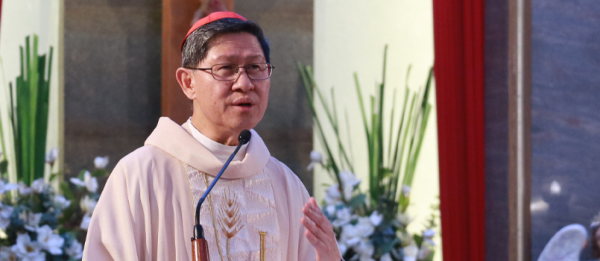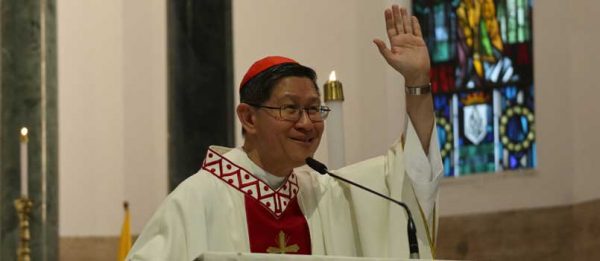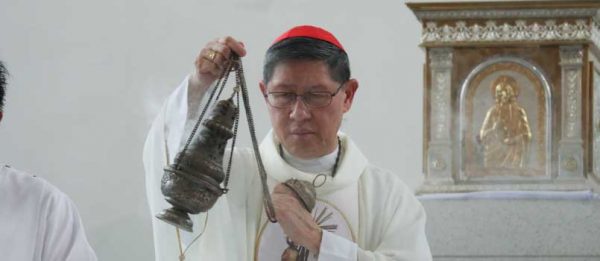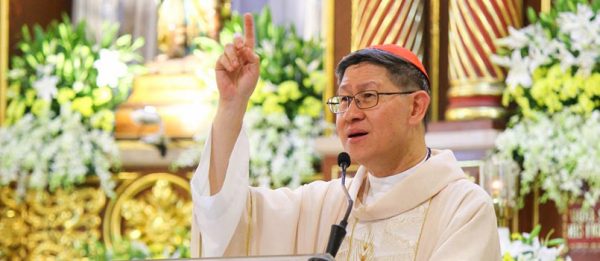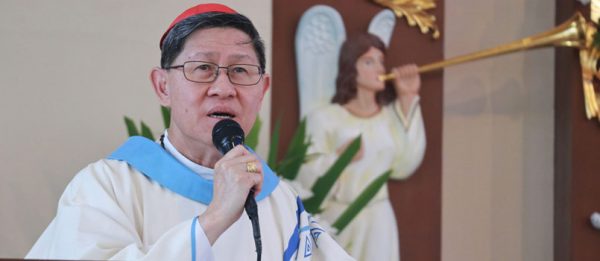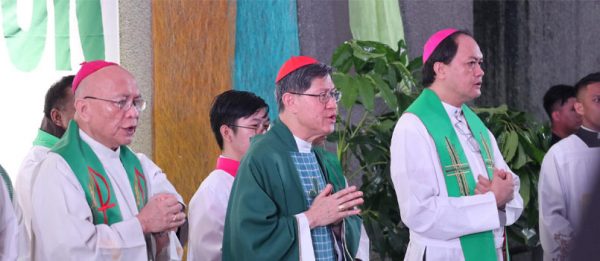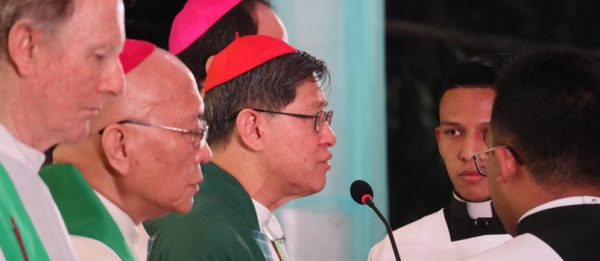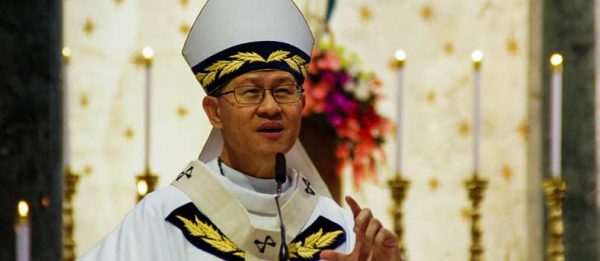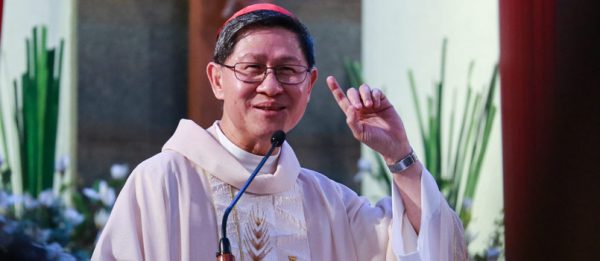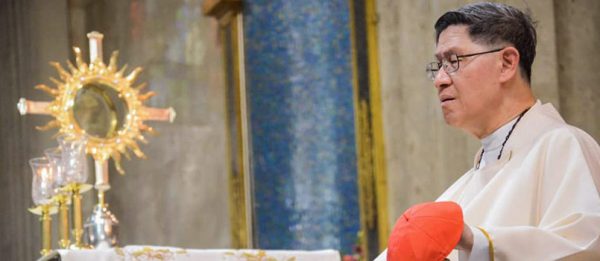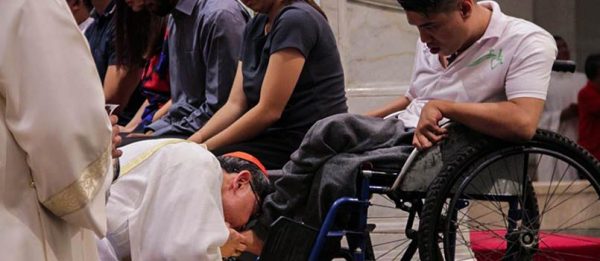226 total views
Homily of Papal Nuncio to the Philippines Abp. Gabriel Giordano Caccia
during the Pope’s Day and Vigil Mass for the Solemnity of Sts. Peter and Paul,
at the Manila Cathedral, 28th of June 2018
Your Excellencies, and dear brother Bishops present here tonight in large number,
Your Excellencies, the Ambassadors and Colleagues of the Diplomatic Corps, thank you for your presence. Distinguished Government Officials, reverend Fathers, Reverend Sisters,
My dear brothers and sisters in the Lord, dear friends
We gather together this Evening, the vigil of the Solemnity of Saints Peter and Paul, to celebrate the Holy Eucharist where we pray in a special way for the wellbeing, the ministry and the intentions of His Holiness Pope Francis, on the sixth year of His Pontificate.
I am very grateful to His Eminence Cardinal Luis Antonio Tagle and his collaborators in the Archdiocese of Manila, especially the Rector of this Cathedral, Fr. Reginald Malicdem, for their graciousness in organizing this celebration of the Pope’s Day, which actually is my first as Apostolic Nuncio to the Philippines.
The good Cardinal cannot be with us this evening because he is Rome. In few hours, he will join the Consistory in which the Pope will create fourteen new Cardinals coming from all over the world, including Iraq, Pakistan, Poland, Peru, Japan, Madagascar, Italy. According to Pope Francis, the places of origin of the new cardinals show the universality of the Church that continues to preach the merciful love of God throughout the earth, and the fact that they are all in Rome, shows the unity of the disciples in preaching the unique Gospel, founded on the rock of Saint Peter’s profession of faith.
Pope-Emeritus Benedict XVI described this universality beautifully, saying: “Catholicity means universality – a multiplicity that becomes unity; a unity that nevertheless remains multiplicity”. “Catholic” and “one”. Today’s Solemnity puts emphasis on these ecclesial characteristics even more profoundly and I would like to quote again, Pope Benedict, he said;
“Since the most ancient times the Church of Rome has celebrated the Solemnity of the Great Apostles Peter and Paul as a single Feast on the same day, 29th June. It was through their martyrdom, that they became brothers; together they founded the new Christian Rome. The blood of martyrs does not invoke revenge but reconciliation. It is not presented as an accusation but rather as the “fairer light”, as the force of love that overcomes hatred and violence, thus founding a new city, a new community. Through their martyrdom they – Peter and Paul – became Roman citizen forever. Through their martyrdom, through their faith and love, both Apostles point to where true hope lies; they are founders of a new sort of city that must be constantly rebuilt in the midst of the old human city that is threatened by the opposing forces of human sin and selfishness. By virtue of their martyrdom, Peter and Paul are in a reciprocal relationship forever. They died for the one Christ and in their witness for which they gave their lives, they are one.
Now we know that Peter and Paul met in Jerusalem at least twice; the paths of both were ultimately to converge in Rome. We ask ourselves why? Might this be something more than a pure chance? Might this contain a lasting message? Let us see.
Paul arrived in Rome as a prisoner but, at the same time, as a Roman citizen who, precisely as such, after his arrest in Jerusalem had appealed to the Emperor to whose tribunal he was taken. However, in a deeper sense Paul came to Rome of his own free will. Through some of his most important Letters he had already become inwardly close to the city: he had addressed to the Church in Rome the writing that sums up the whole of his proclamation and his faith better than any other. In the initial greeting of this Letter he says that the faith of the Christians of Rome is being talked about in all the world and is, therefore, reputed everywhere to be exemplary. He then writes: “I want you to know, brethren, that I have often intended to come to you but thus far have been prevented.” And at the end of the Letter he returns to this topic now speaking of his project of a journey to Spain. He said “I hope to see you in passing as I go to Spain, and to be sped on my journey there by you, once I have enjoyed your company for a little.” These are two things that become obvious: for Paul, Rome was a stopping place on the way to Spain, in other words – according to his conception of the world – on his way to the extreme edge of the earth. He considers his mission to be the fulfillment of the task assigned to him by Christ, to take the Gospel to the very ends of the world. Rome lay on his route. Whereas Paul usually went to places where the Gospel had not yet been proclaimed, Rome was an exception. He found there a Church whose faith was being talked about across the world. Going to Rome was part of the universality of his mission as an envoy to all peoples. The way that led to Rome, which already prior to his external voyage he had travelled inwardly with his Letter, was an integral part of his duty to take the Gospel to all the peoples – to found the Catholic or universal Church. For him, going to Rome was an expression of the Catholicity of his mission. Rome had to make the faith visible to the whole world, it had to be the meeting place of the one faith.
But why Peter did go to Rome? The New Testament says nothing about this directly. Yet, it gives us hints. Peter, who complying with God’s order, had been the first to open the door to pagans, as described by the episode of the centurion Cornelius in the Acts of the Apostles, left the leadership of the Christian-Jewish Church of Jerusalem to James the Lesser in order to dedicate himself to his true mission: the ministry for the unity of the one Church of God formed both by Jews and pagan, first he did that in Antioch and later in Rome.
Among the Church’s characteristics, St. Paul’s desire to go to Rome places emphasis on the word “Catholic.” St Peter’s journey to Rome as representative of the world’s people comes especially under the word “one.” His task was to create unity of the Catholica, the Church formed by Jews and pagans, the Church of all the peoples. And this is Peter’s ongoing mission even today, to ensure that the Church is never identified with a single nation, with a single culture or with a single State but it is always the Church of all; to ensure that she reunites humanity over and above every boundary and, in the midst of the divisions of this world, makes God’s peace present, the reconciling power of his love.
In the world today, thanks to technology that is the same everywhere, thanks to the world information network and also thanks to the connection of common interests, new forms of unity exist; yet they spark new disputes and give a new impetus to the old ones. In the midst of this external unity, based on material things, our need for the inner unity which comes from God’s peace is all the greater – the unity of all those who have become brothers and sisters through Jesus Christ. This is Peter’s permanent mission and also the specific task entrusted to the Church of Rome.
Let us pray then tonight for Pope Francis, the present Bishop of Rome and the Successor of St. Peter, to continue by the grace of God his ministry of communion and unity.
And let us pray to the Lord that we too, through the intercession of Saints Peter and Paul, may be strengthened to be witness everywhere of the love of Jesus and promoters of unity and communion, so that the world may believe. Amen.












